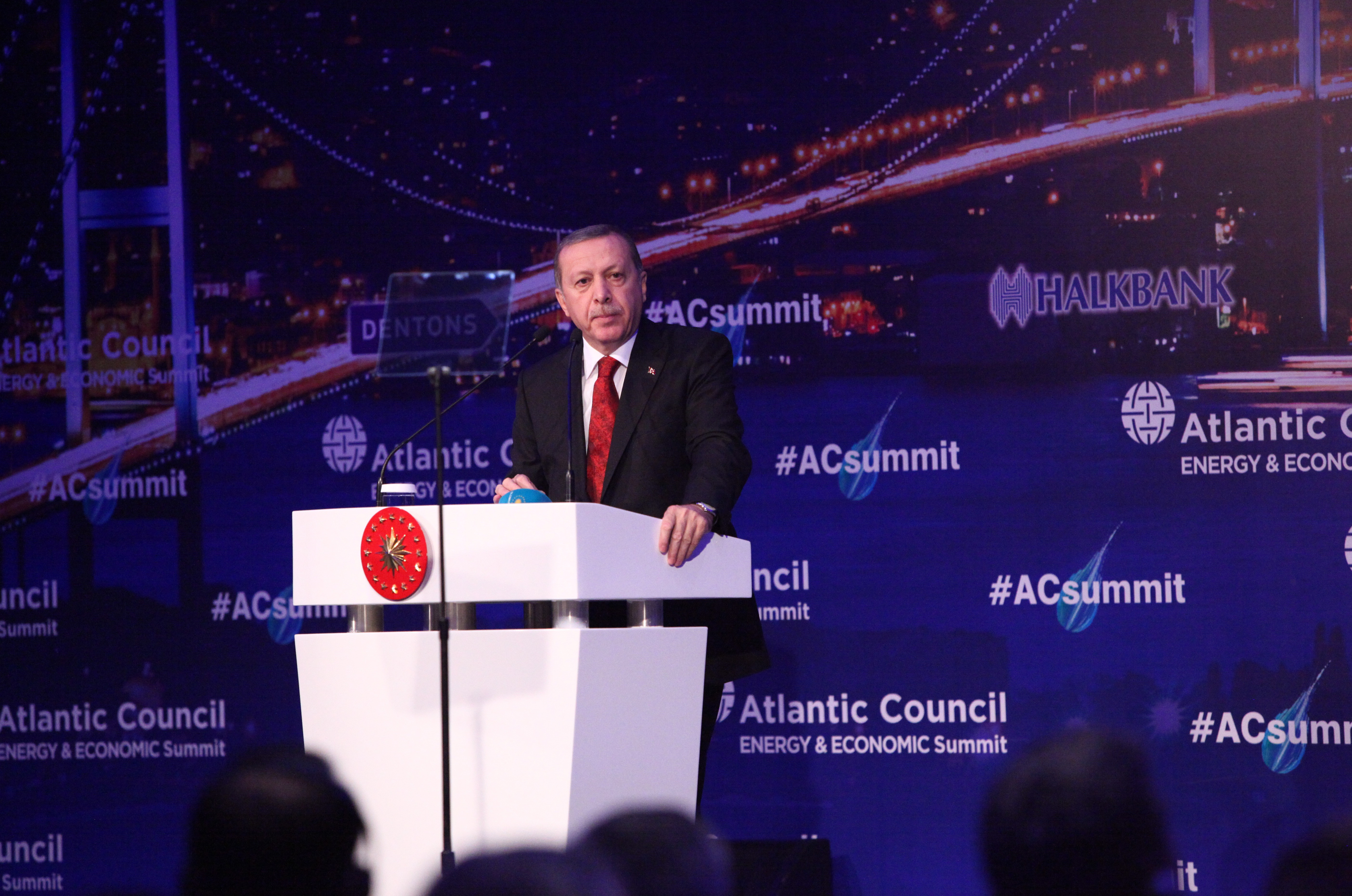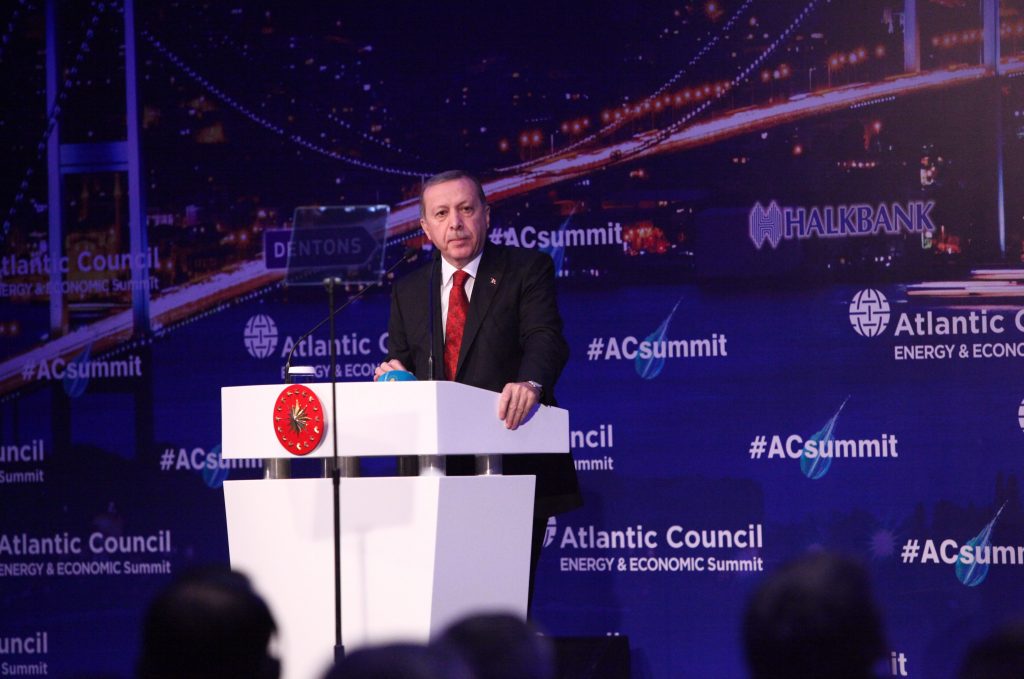
Erdoğan warns ‘hardening of attitudes’ will deepen humanitarian crisis
Turkish President Recep Tayyip Erdoğan on Nov. 19 criticized the growing backlash against migrants in the wake of the terrorist attacks in Paris saying this will only deepen the humanitarian crisis unleashed by the war in Syria.
“We have been condemning the Paris attacks with our sincerity. We have been sharing the grief of the French public, but we have started hearing [of] attacks on Muslims in several places,” Erdoğan said in his keynote address at the opening session of the Atlantic Council’s seventh annual Energy & Economic Summit in Istanbul.
In European countries where Muslims are a minority, an “increasingly prejudiced and exclusionist attitude has been increasing,” he said. Such a “hardening of the attitudes [toward] the migrants… would only deepen the human crisis,” he added.
Describing Islam as a religion of peace and noting that Muslims are the primary victims of terrorist groups like al Qaeda and Boko Haram, the Turkish President warned that “racism is merging with anti-Islamism” and this poses a significant threat, especially to Europe.
Erdoğan’s comments were a significant rebuke to some Republican Governors and presidential candidates in the United States and the leaders of far-right political parties in Europe who have used the terrorist attacks in Paris to justify shutting their doors to migrants fleeing the war in Syria.
The discovery of a Syrian passport — possibly forged — near the scene of a suicide bombing in the French capital and confirmation that one of the attackers had entered Europe as part of a wave of hundreds of thousands of migrants has caused some to worry about the security implications of the migrant influx. The Paris attacks on Nov. 13 left at least 129 people dead and more than 350 wounded.
US President Barack Obama, speaking in Manila on Nov. 18, described calls from some Republican presidential candidates to take in only Christian migrants and vows from some Republican Governors to turn away migrants as a “potent recruitment tool” for the Islamic State of Iraq and al-Sham (ISIS).
The Obama administration has said it will take in 10,000 Syrian migrants over the next year. The White House has reiterated that this policy will not change, despite Republican opposition.
Erdoğan exhorted world leaders to take a stand against the growing intolerance toward migrants. “In Europe and other countries racist attacks have been on the increase,” he said. “If we cannot prevent them, new and dangerous disasters will be inevitable.”
“I condemn all sorts of extremism and I would expect a similar approach from other leaders,” he added.
Turkey has taken in more than two million Syrians since the start of the war in Syria in 2011. There are 500,000 Syrian refugees in Istanbul alone. These migrants have placed a huge economic burden on Turkey and caused a “psychological trauma” on Turkish society, said Erdoğan.
“We have not closed our doors in the face of these refugees. We have opened our doors,” he added.
Mayors of more than a dozen US states, including New York, Chicago, and Los Angeles, have, meanwhile, said that they will welcome Syrian migrants.
Assad’s ‘state terror’
Syrian President Bashar al-Assad’s regime is the root cause of recent terrorist attacks and the ongoing humanitarian crisis, epitomized by the wave of migrants pouring into Europe, said Erdoğan.
“His is a state terror,” he said. And in a swipe at Russia and Iran, he added: “Those who are standing behind him are at least as guilty as he is.”
Attempts by world powers to bring an end to the conflict in Syria have been tangled up in the question of Assad’s political fate. While the Obama administration is adamant that Assad cannot be part of a solution, Russia has disagrees. Turkey shares the US position on Assad’s political fate.
Erdoğan expressed frustration with this debate.
Noting that 380,000 Syrians have been killed in the war that is now in its fifth year, the Turkish President said, “And still, should he go, should he not go? Discussing this … what kind of message is it [sending] not to his own people only but to the rest of humanity?”
In 2013, at the G20 summit in St. Petersburg, Russia, world leaders discussed whether the Assad regime had used chemical weapons, Erdoğan recalled, while pointing out that the number of victims of alleged chemical weapons is significantly smaller than those killed by conventional weapons. “Who gave these conventional weapons to Syria?” he added. Russia has been a major supplier of weapons to the Assad regime, and over this past summer has stepped into the conflict in a more prominent way conducting airstrikes against the regime’s opponents, including rebel groups that are backed by the United States.
Erdoğan accused the Assad regime of supporting ISIS by purchasing oil from the terrorist group. “We have to be wise enough to see this,” he said.
Turkey has borne some of the brunt of the fallout of the war in its neighbor — Syria. The Turkish government blamed ISIS for a deadly bombing in Ankara in October in which more than 100 people were killed.
“Today in Ankara they knocked on our door and I said they will be knocking on your door tomorrow, which they did in Paris,” Erdoğan said of ISIS, while calling for a global effort to address terrorism.
In his address, the Turkish leader singled out the Kurdish terrorist group, the Kurdistan Workers’ Party (PKK), for criticism. Peace talks between the Turkish government and the PKK collapsed earlier this year and fighting has escalated with the PKK attacking Turkish security forces and the Turkish military bombing the PKK in Turkey and northern Iraq.
Erdoğan accused the Assad regime of supporting Kurdish groups. “Daesh and PYD, YPG are no different from one another,” he said, referring to ISIS by its Arabic name. The United States and Turkey have been at odds over the Kurdish People’s Protection Units (YPG), the military wing of the Syrian Kurdish Democratic Union Party (PYD). YPG fighters have played a significant role in the US-led war on ISIS in Syria, providing coordinates of ISIS positions for US jets to bomb.
Turkey and the EU
Erdoğan stressed the importance of diversification of energy sources to ensure energy security — a key concern for Europe at a time when most European countries rely on Russia for their energy supply.
Energy should “be a vehicle of peace and prosperity,” Erdoğan said, adding that the transport of oil across Turkey to Europe will contribute to European energy security.
In a direct challenge to Europe, he asked why the EU has not yet financed the so-called Southern Gas Corridor. Turkey is working with Azerbaijan to develop Azerbaijan’s offshore Shah Deniz II field and the Southern Gas Corridor.
The migrant crisis has put a spotlight on collaboration between Turkey and the European Union, which will have a deep impact on Eurasia and the Middle East, the Turkish President said.
Describing Turkey as a worthy partner, he added, “economic and social dynamism is something that Europe needs the most and Turkey is the only country that can provide it for Europe, if it becomes a member.”
Ashish Kumar Sen is a staff writer at the Atlantic Council.
Image: Turkish President Recep Tayyip Erdoğan delivered the keynote address at the opening session of the Atlantic Council’s seventh annual Energy & Economic Summit in Istanbul on Nov. 19. (Atlantic Council/Victoria Langton)
